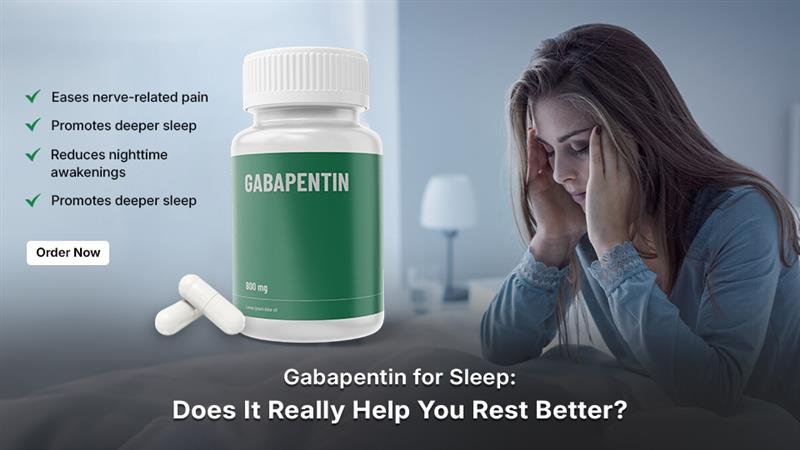You know the feeling. Midnight creeps into the morning, the ceiling fan spins like a lazy eye, and your brain won’t quit chewing over that one thing you said six days ago. Sleep, once so effortless as a child, now seems locked behind some invisible door. You try warm milk, white noise, and chamomile tea. Nothing works. And then someone mentions Gabapentin for sleep.
It sounds clinical, like something your aunt with nerve pain takes. But there’s a growing hum around Gabapentin and its surprising role in the world of sleep. So, what’s the truth? Can this off-label drug help you drift into a deeper, dream-rich rest?
Let’s unlock that door together.

What Is Gabapentin?
Originally approved by the FDA in 1993, Gabapentin was developed to treat epilepsy. Today, it’s more commonly prescribed for nerve pain, anxiety, and restless leg syndrome. Structurally, it mimics GABA (gamma-aminobutyric acid), a neurotransmitter that calms brain activity, but curiously, it doesn’t bind to GABA receptors directly.
Instead, Gabapentin works by balancing calcium passages in the brain. Think of it as lowering the volume on an overactive neural stereo. When your brain won’t stop firing,, whether from pain, stress, or spiraling thoughts, Gabapentin steps in and says, “Let’s quiet down.”
But how did it end up in conversations about Gabapentin sleep?
The Science behind Gabapentin and Sleep
Research into Gabapentin’s effects on sleep began as a happy accident. Doctors prescribing it for pain or seizures noticed patients sleeping better. That led to deeper studies.
A pivotal 2002 study found that Gabapentin improves slow-wave sleep, the deep, restorative phase of the sleep cycle. Gabapentin majorly concentrates on improving the quality of your sleep and doesn’t simply knock you out like most sedatives.
Here’s where it gets compelling:
- A 2014 study showed that Gabapentin significantly increased total sleep time and decreased wakefulness after sleep onset.
- In patients with insomnia linked to anxiety, Gabapentin reduced sleep latency (the time it takes to fall asleep) by up to 30 minutes.
- For individuals recovering from alcohol dependence, Gabapentin improves sleep quality by stabilizing brain chemistry, which is essential for healing.
Even the U.S. National Library of Medicine notes Gabapentin’s efficacy for conditions like primary insomnia and sleep disruptions related to chronic pain.
So, is Gabapentin for sleep the real deal?
Science says: Possibly, yes, with conditions.
Off-Label, But On-Point
Gabapentin is not FDA-approved for sleep. That means if you’ve prescribed it for insomnia, it’s being used “off-label.” This is more common than you might think. Many antidepressants, for instance, are used off-label to treat anxiety or chronic pain.
Still, any off-label use requires caution. You’ll want to work closely with your doctor to weigh benefits versus risks, particularly because Gabapentin can interact with other medications and has known side effects like dizziness, fatigue, and sometimes dependency on long-term use.
But here’s the big takeaway: Gabapentin sleep isn’t about sedation; it’s about balance. By calming the nervous system, Gabapentin gives your brain a chance to wind down naturally.
That makes it especially helpful for:
- People suffering from chronic pain.
- Patients with anxiety-induced insomnia.
- Individuals going through alcohol or opioid withdrawal.
- Sleep disorders involve disrupted REM cycles, such as fibromyalgia.
But Is It Safe?
Like all medications, Gabapentin has risks.
Side effects range from mild (drowsiness, blurred vision) to serious (breathing problems when combined with opioids or alcohol). Often, prolonged usage can cause dependency on this medical drug. In 2019, the FDA added a warning about respiratory depression, especially in patients with existing breathing issues.
It’s also worth noting that abruptly stopping Gabapentin can lead to withdrawal symptoms, so always taper under a doctor’s supervision.
That said, when used responsibly, under medical guidance, Gabapentin has a strong safety record.
Alternatives to Consider
If you’re wary of prescription solutions, that’s okay. Consider integrating Gabapentin into a broader sleep strategy:
- Cognitive Behavioral Therapy for Insomnia (CBT-I): Gold-standard remedy for critical insomnia.
- Melatonin: A safer short-term option for sleep-wake cycle disruptions.
- Magnesium glycinate: Supports muscle relaxation and calm.
- Herbal options like valerian root, ashwagandha, or passionflower can also support natural rest.
Gabapentin shouldn’t replace healthy sleep habits; it should support them.
Final Thoughts: Should You Try Gabapentin for Sleep?
Sleep is sacred and elusive for many. If you’ve tried everything from blue-light filters to bedtime yoga and still find yourself haunted by 3 a.m. thoughts, it might be time to talk to your doctor about Gabapentin for sleep.
It’s not a miracle cure. It won’t work for everyone. But for the right person, at the right dose, Gabapentin can be the key to unlocking deeper, more restorative rest.
Just remember: it’s not about escaping into sleep. It’s about returning to it.
Looking to Sleep Smarter, Not Harder?
At Pharmaticus, we are hardcore supporters of sleeping peacefully and deeply, and we treat it as a necessity and not as a mere luxury. Whether you’re managing pain, anxiety, or chronic restlessness, our team is here to support your wellness journey.
Explore our safe, pharmacist-reviewed Gabapentin options and talk to your healthcare provider to see if it’s right for you.
Rest better & live brighter with Pharmaticus.
FAQ’s
1. How good is Gabapentin for sleep?
Users acknowledged better and deeper sleep, along with an increase in total sleep time.
2. How much Gabapentin should I take for sleep?
Follow the advice of your healthcare advisor; however, adults can start with a single dose of 300 milligrams.
3. Can I take Gabapentin every night?
Seek advice from your healthcare expert. Normally, it is taken 3 times a day – morning, afternoon, and night.
4. Who should not take Gabapentin?
Pregnant women, anyone who is trying to get pregnant, addicts, and individuals who plan on misusing it.



